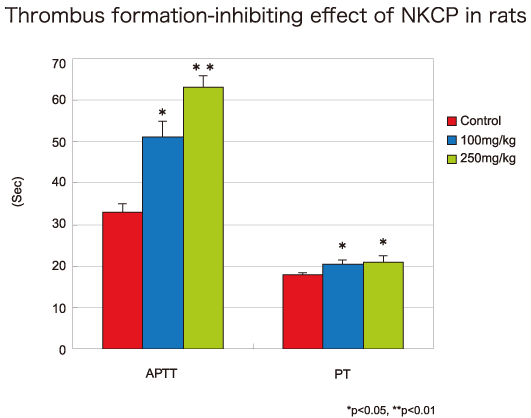Anticoagulant effect of NKCP in rat model of thrombosis formation
The anticoagulant effect of NKCP was studied in a rat model of thrombus formation. In this model, platelet aggregation was caused by injuring endothelial cells of the abdominal descending aorta to induce thrombus formation. NKCP was administered into the duodenum 2 hours after producing the thrombus formation model using in situ loop method. Blood was collected from the abdominal aorta 6 hours after administration to determine activated partial thromboplastin time (APTT) and prothrombin time (PT) as indicators of endogenous and exogenous coagulations, respectively. APTT was 33.5 ± 2.4 seconds for the control group (administered physiological saline), 52.0 ± 4.5 seconds for the NKCP 100mg/kg group, and 63.3 ± 2.9 seconds for the NKCP 250mg/kg group. A significant coagulation delay was observed in the NKCP treatment groups as compared to control. PT was 16.7 ± 0.5 seconds for the control group, 20.6 ± 0.9 seconds for the NKCP 100mg/kg group, and 21.3 ± 1.7 seconds for the NKCP 250mg/kg group. As with the APTT, a significant coagulation delay was observed in the NKCP group as compared to control. These results suggest NKCP inhibits thrombus formation.

Research and Development Department, Daiwa Pharmaceutical Co., Ltd., 2001
